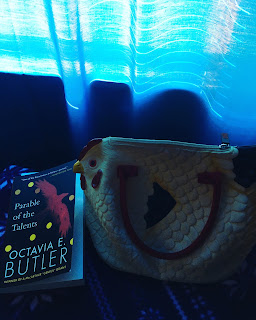Let Me In
John Ajvide Linqvist
Thomas Dunn Books
2004
Translated from the Swedish by Ebba Segerberg 2007
Ms. Hen decided to read this novel because she is currently
interested in vampire fiction, as you may have learned from her last post. She
had seen the film LET THE RIGHT ONE IN many years ago, but she never read the
novel until now. She had vague memories of the film when she read this, but she thinks
it’s different in many ways. She is planning on watching the film again soon.
There are a lot of comparisons with this novel and work by
Stephen King, but Ms. Hen thinks it’s drastically different. Ms. Hen has read a
couple of books by Stephen King, but she doesn't think he is a good writer. This
novel is a scary book that is actually well written. A lot of horror novels,
and vampire fiction in particular, are not composed of quality writing, but this novel gripped
Ms. Hen from page one. She read it fast, though it’s long; she was so engrossed, and she read it a lot faster than she would have if she was working normal hours,
since she has ample free time these days.
LET ME IN is about a teenage boy, Oskar, who befriends a
vampire named Eli. He doesn’t know she’s a vampire at first, but he discover
the fact later. She is mysterious to him, and he likes her, though she looks
young. A cast of characters surround the story and live in the suburban
wasteland outside of Stockholm. Oskar is bullied at school because he
is overweight, and he strikes back. A group of alcoholics gather at a Chinese
restaurant want to know what happens to their friend who went missing, who one
of the men think was murdered by a child.
The characters in this novel are interesting to Ms. Hen
because they are not nice and kind to each other; they are rotten and resentful
of their positions in the world and the dingy neighborhood in which they live.
In that way, they seemed realistic to Ms. Hen; they are not delusional, and for the most part, they do not have ideas about their lives magically getting better.
There are some chickens in this novel, which Ms. Hen found
charming. One place that made her smile was when Tommy, the juvenile
delinquent, invites Eli into the storage area where he has been sniffing glue,
and she is wearing a yellow dress, “He saw her as an enormous chicken, giggling
at his vision.” She then offers to
pay him to drink his blood.
Ms. Hen found this novel highly engrossing, and an excellent
distraction from the troubles of today’s world. There’s nothing like murdering
vampires to brighten up a dreary springtime. Ms. Hen read an article recently
about the myth of vampires and how the idea came about during The Black Death,
or the bubonic plague. You can read it here:
Let’s hope that if new vampires appear as a result of this virus, they are on our side.




